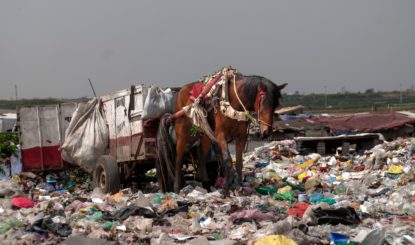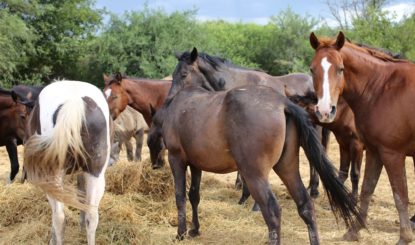Eleven Years of Campaigning For a Better Life For Humans and Horses
In June 2022, Fondation Franz Weber’s campaign “Basta de TaS” (Stop The Use of Rubbish-collection Horses) will be eleven years old. Thanks to this campaign, horses used in Latin America to haul away tons of rubbish can be freed and replaced by motorised vehicles.
We would like to celebrate the anniversary (10 years plus 1) of this historic campaign by sharing a recap of the program, some anecdotes and key dates.
A New Man Thanks to “Basta de TaS”
In April 2015, I visited for the last time Paraná, capital of the province of Entre Ríos in Argentina. The “Basta de TaS” campaign, which aims to free rubbish-collection horses in Latin America while promoting the social integration of the rubbish collectors’ families, had taken me there several times in the years before: to talk to local governments, activists and workers, and to promote, facilitate and accompany the implementation of the replacement program. At the time, the campaign had only been running for three years, but more than 100 horses had already been replaced by motorised vehicles.
After a meeting I attended where the government presented the excellent results of the program, a man approached me and asked with a smile, “Leonardo, do you remember me?” I replied, “Unfortunately, no,” even though he looked vaguely familiar. He laughed and said, “No wonder, we met three years ago, but today I look twenty years younger.” The man was Juan. That day he reminded me of a story that I had completely forgotten and that I would like to share with you today.
Fear of Unemployment
In 2012, the Paraná Municipality agreed to a pilot project to replace six horses with motorised carts. In parallel, a program of social integration, professional training and regulation of the families‘ working conditions was launched. The horses were supposed to find a new home at our future sanctuary outside of Córdoba. At that time, conservationists opposed the project, simply because it was supported by the mayor of the city, who belonged to the political party traditionally opposed to conservation. They feared that the project would put families out of work. A controversy arose between those who wanted to simply prohibit the rubbish collection with animals – which would have plunged the families into misery – and those who, despite all the cruelty to animals, wanted to continue as before.
The Sixth Man
One evening, the secretary for social integration of the municipality summoned me to a meeting to inform me that only five workers wanted to participate in the project and that if we did not find a sixth volunteer as soon as possible, the project would be cancelled. If we were not even able to get six rubbish collectors interested in the project, he said, we would never be able to solve a problem that affected more than 700 animals.
A Sign from the Universe
I remember being devastated as I left that meeting. I was indignant, sad and confused. I sat down on a bench across from the hotel where I stayed and thought that all the effort, all the drive could not be destroyed simply by a misunderstanding or a political controversy. It was almost poetic that just at that moment, a horse cart passed by. The man on it was completely drunk. There I knew, this cart was more than just a sign: it was an opportunity! I stopped the driver and asked if we could talk for a moment. I explained the program to him. He replied that he could neither read nor write and that the horse took him home every evening when he drank too much, which a motorcycle would not. I insisted. He told me to visit him the next day at his house. The next morning his wife was also there and I talked to both of them. Encouraged by her, he accepted my offer. That man was Juan.
The Big Change
When we met again in 2015, Juan had not only learned to read and write; he had also been trained in the use of motorised carts and was a driving and riding instructor in the Paraná City Council’s replacement program that followed the pilot. And indeed, he did look 20 years younger! Juan told me he didn’t drink anymore, had fixed his house, and decided to send his oldest son to university. Today, he wears a uniform to work, is clean and confident. Every night, he returns home right after work to help his wife with her newly established tailoring business. Close to tears, I hugged him and said, “This is what ‘Basta de TaS’ is all about: no more enslaved horses, no more excluded people.”
Juan is just one example of many. Since 2011, our campaign has helped 7,000 similar cases – children, grandchildren, parents, pets, neighbours and colleagues. Basta de TaS has improved the lives of people who were excluded due to their social and professional status. It has changed their lives economically, socially, politically, in terms of education, family, health, emotionally and often even spiritually.
The Campaign Today and in the Future
Since the campaign was launched in 2011, we have visited more than 100 cities in several Latin American countries, including Argentina, Uruguay, Chile, Colombia, Ecuador and Mexico. We have been able to promote and implement nearly 50 replacement programs for rubbish-collection horses. While many of the programs have replaced all of the city’s horses, others are still in progress, and others have had to be discontinued due to abrupt changes in the political situation.
I would like to point out once again that the programs to replace rubbish-collection horses are decided and implemented by the municipalities. Fondation Franz Weber encourages them to do so and provides technical advice, especially in the form of detailed guides to program implementation written by our team. We also help them to understand the program and to establish good relationships with the media, animal rights activists and, of course, the waste collectors themselves.
In a few months, we will give the campaign another boost to accelerate the implementation of the programs in the different countries. We will publish a training course for municipal officials that will be available online at www.escuelaFFW.org.


